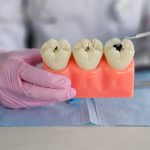Are you thinking about dental implants, or have you just gotten dental implants and are wondering how to maintain them for years? Dental implants in Crestview FL are the perfect solution to be used for a long time in the case of missing teeth, to bring back the stomatognathic system’s function, and to raise your self-esteem. Correct post-oral care is vital to keep your dental work safe and for your smile to be with you for a lifetime.
Why Dental Implant Aftercare Matters
Looking after a dental implant is more than just normal brushing. Although implants merge with your jawbone, thus providing a strong base, neglect can cause the occurrence of various problems, such as infection, gum irritation, or even implant failure. Proper care under the supervision of a dentist not only promotes good oral health but also ensures that your new teeth will last for a long time.
What are the Early Recovery Tips After Dental Implants
The first few days after getting an implant are very important. Here are essential dental implant recovery tips:
- Rest and avoid strenuous activity: Give your body time to heal.
- Follow your prescribed diet: Soft foods reduce pressure on the implant site.
- Manage swelling and discomfort: Use ice packs and take medications as advised.
- Maintain oral hygiene: Gentle rinsing with salt water helps prevent infection.
A Crestview dentist near you can monitor healing and address any concerns early in the recovery process.
How Can You Properly Clean Your Dental Implants?
Implant maintenance involves a great deal of personal care and regular visits to the dentist. The best way to clean dental implants includes:
- Use a soft toothbrush to brush your teeth two times a day.
- Use toothpaste that is not abrasive
- Use dental floss carefully around the area of the implant
- Introduce interdental brushes or water flossers if there are spaces that cannot be reached with regular floss
- Go for professional cleaning appointments every six months at the dental office in Crestview FL.
The act of proper cleaning is the main way to prevent the buildup of plaque, which is very important because implants lack the protection of enamel like natural teeth.
What Are the Foods and Habits to Avoid
Knowing what to avoid after dental implants helps prevent complications:
- Foods that are hard or sticky may put pressure on the implant
- Smoking, which slows healing and increases infection risk
- Chewing ice or non-food items
- Skipping oral hygiene routines
- Ignoring discomfort or unusual symptoms
Following these guidelines ensures your implants integrate successfully and last longer.
How to Make Dental Implants Last a Lifetime?
Regular care is actually the secret to the success of dental implants in the long term. To know the ways dental implants last a lifetime, consider:
- Going to the dentist regularly
- Keeping up with good oral hygiene overall
- If you are a tooth grinder, using a night guard
- Being aware of your diet and lifestyle habits
- Immediately, report if there is an issue such as swelling, pain, or mobility
Healthy gums and jawbone are the two major factors for the longevity of implants, and these steps go a long way in shielding them.
What Are the Signs of Potential Problems?
If you have taken great care, it is still necessary to look out for the signs of trouble:
- Constant pain or swelling
- The implant or crown is loose
- Unusual bleeding or pus
- Changes in the way the teeth come together
Preventing the problem at its earliest stage enables your dental team to take action before it progresses.
Keep Implants Strong with Pro Care!
Do you want your dental implants to last for a long time? Receive a consultation with Freedom Dental and then, by our expert guidance and exclusive treatment, get a smile that will be both vibrant and lasting for years.
FAQs
How long does it take to fully recover from dental implants?
Usually, the initial recovery will be 1–2 weeks, but the complete osseointegration (bone healing around the implant) can take 3–6 months.
Can I eat normally after my dental implant procedure?
Yes, but you should begin with soft foods during the first week and then gradually return to your regular diet as the healing process continues.
Do I need special toothpaste for implants?
It is recommended to use a soft and non-abrasive toothpaste so that the implant surface or the gums around the implant are not damaged.
Is it normal to experience mild discomfort after implants?
Yes, a little swelling or soreness is among the common side effects. If the unpleasant feeling continues or becomes worse, you should contact your dental team without delay.
Can dental implants fail even with proper care?
Although very infrequent, implants may fail due to infection, overload, or other health-related causes. Taking good care of your teeth and visiting your dentist regularly and on time will lower to a great extent the risk of failure.






